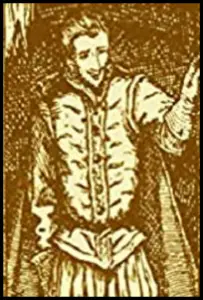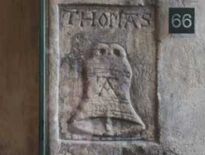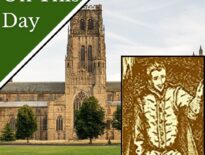 Today is the anniversary of the execution of Durham martyr John Boste in 1594, so I thought I'd share more details on Boste's life and how he came to be martyred in Elizabeth I's reign.
Today is the anniversary of the execution of Durham martyr John Boste in 1594, so I thought I'd share more details on Boste's life and how he came to be martyred in Elizabeth I's reign.
Here are some facts about St John Boste:
- John Boste was born in 1544 and was the youngest son of Nicholas Boste of Wellyng Manor, Dufton, Westmorland, and his wife, Janet Hutton.
- Boste was educated at Queen's College, Oxford, where he attained a BA in 1568 and an MA in 1572.
- He was elected as a fellow at Queen's College in October 1572, then, he became a teacher at Appleby Grammar School in his home county in 1573, working there for a year.
- In 1576, Boste converted to Roman Catholicism. His biographer J. Andreas Löwe states that this was probably at the home of Sir Thomas Cornwallis, in Suffolk, citing Anthony Atkinson, searcher of Hull, who apprehended Boste in 1593. Atkinson recorded in a letter to Robert Cecil that before he went overseas, Boste "lay at Brome in Suffolk". As a result of his conversion, Boste was expelled from his fellowship at Queen's.
- In 1580, Boste left England for the Low Countries, where he became a tutor to Gerard Clibborn before they both travelled to the English College in Rheims. In March 1581, Boste was ordained as a priest.
- Following his ordination, Boste was sent back to England, landing at Hartlepool in the north of the country. Löwe notes that he then became one of "the most sought-after priests in the north". For example, Anthony Atkinson gave information to the Crown in 1590 that Boste was being kept "very secretly" in the north of England.
- On 10th September 1593, Boste was finally apprehended after being betrayed by a man named Francis Ecclesfield. Anthony Atkinson reported that he arrested Boste while he was saying mass at Waterhouses, County Durham, the home of William Claxton (who was abroad at the time), in the company of Lady Margaret Neville and Mrs Claxton. Atkinson took them to Brancepeth Castle. Atkinson examined Boste regarding whether he sent intelligence overseas and to try and get him to name others, but Boste made it "a conscience not to accuse no man".
- In October 1593, Boste was transferred to Windsor, where he was racked by Richard Topcliffe in an attempt to get him to name names. Even though he was racked terribly, Boste would not part with any names and a record of his examination states that those examining him had "never heard a more resolute traitor". Boste affirmed that he loved the queen and that he "would take her part" if the Pope himself sent an army against her, but that if the Pope "by his Catholic authority" proceeded against her "to deprive her as an heretic, then he cannot err, nor the Church, then Catholics must obey the Church." Those examining Boste recommended that he be moved to the Tower. However, he was sent back to Durham in the summer of 1594, where he was tried on 24th July with priest John Ingram for treason, for leaving and re-entering England without permission. When they were found guilty and condemned to death, Boste "sung with a joyful heart and a cheerful countenance te deum laudamus, etc. and Mr Ingram answered, te aeternum Patrem, etc. Then Mr Boast [Boste] said, qui odit animam suam in hoc mundo, in vitam aeternam custodit eam, etc." Boste was quoting John 12 verse 25: "he that hateth his life in this world shall keep it unto life eternal".
- At 4pm on 24th July 1594, on the same day of his trial, John Boste was hanged, drawn and quartered.
Boste was conveyed by cart to the gallows, blessing people on the way. In Bishop Challoner's "Memoirs of Missionary Priests" is an account of Boste's execution by eye-witness Reverend Mr Christopher Robinson. Robinson writes of how Boste tried to make a speech, but was cut off, so said to the crowd, "I hope in God that if you will not suffer me to speak unto you in this world, this my death will speak in your hearts, that which I would have spoken". He was then able to speak more:
"At last said he, seeing you will not suffer me to speak to you, suffer me speak to my soul in the psalms of the prophet David. You may, said the sheriff. Then said the martyr, holding up his hands towards the heavens, fixing his heart upon God, and lifting up his eyes: — Convertere anima mea in requiem tuam, quia Dominus beneficit tibi. Return, O my soul, into thy rest, because God hath done well unto thee. And why hath God done well unto thee? It followeth; quia eripuit animam meam a morte, oculos meos a lacrymis, pedes meos a lapsu. Because he hath delivered my soul from death. From death, what is that? From the sting of heresy, wherewith our country, alas! is infected, plagued and pestered. So, said the sheriff, keep your peace, speak no more. Alas! said he, this is but the psalm of the prophet, and therefore cannot be hurtful. Yea, said the sheriff, but you make a commentary upon it; say it in Latin as oft as you will. Then the martyr seeing it was not allowed to speak English, repeated the words of the prophet in Latin until he came to the end of the psalm."
Boste also affirmed that upon his death, he never intended to hurt the queen.
Boste was then hanged, taken down, his belly cut open, his "members" cut off and thrown into the fire before his bowels were removed "in a most butcherly manner". He was then beheaded and his body quartered.
Bishop Challoner states that Mrs Claxton was condemned to death for harbouring John Boste, but that "she was reprieved by the means of friends, and afterwards pardoned."
Notes and Sources
- Pollen, John Hungerford (1908) Unpublished documents relating to the English martyrs, Volume I, J Whitehead & Sons.
- Challoner, Richard (1839) Memoirs Of Missionary Priests And Other Catholics Of Both Sexes That Have Suffered Death In England On Religious Accounts From The Year 1577 To 1684, Two Volumes In One, John T Green.
- Löwe, J. (2004, September 23). Boste, John [St John Boste] (1544–1594), Roman Catholic priest and martyr. Oxford Dictionary of National Biography. https://www.oxforddnb.com/view/10.1093/ref:odnb/9780198614128.001.0001/odnb-9780198614128-e-2939.
Image: An illustration of John Boste from "The Life and Times of Saint John Boste: Catholic Martyr of Durham 1544 - 1594" by Simon Webb.



Leave a Reply